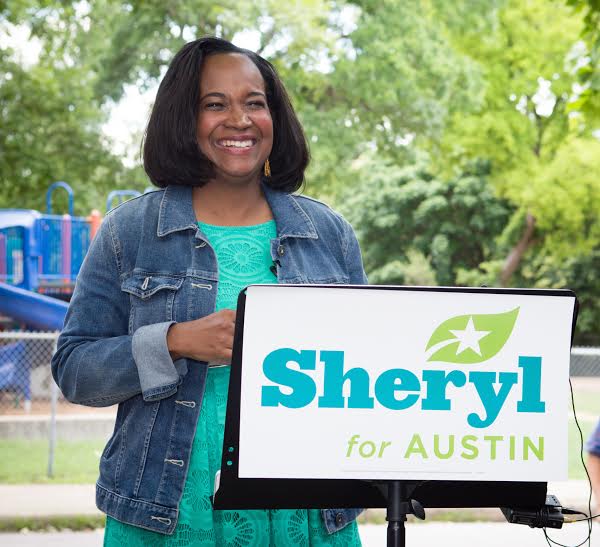Editor’s Note: In the run-up to the November election for mayor, the Texan will be running Q-and-A’s with the candidates. Voting is open only to those registered to vote in Austin and registration continues through Oct. 6. Early voting starts Oct. 20 and ends Oct. 31. Election Day is Nov. 4. For more information on Cole’s views on transportation, see our Sept. 2 editorial.
The Daily Texan: Why are you running for mayor?
Sheryl Cole: I was first involved in public service when my oldest son registered for school. He’s actually my nephew. His mother was in a car accident. And so when I went to the school, and I was telling the teacher all my concerns, and she said, “Ms. Cole, we got it.” And that was a pivotal moment for me because it let me know that that is what government is supposed to do at every level, whether you’re talking about professional employees, the superintendent or the governing body. Then later on, after being involved in the Austin Urban League and Leadership Austin and many other civic organizations, Communities in Schools, I was a tri-chair of an AISD bond campaign. I went and visited the schools, and they were in horrible, horrible shape. I mean leaky roofs, overflowing toilets, rodents, really bad. I went back and talked to all my PTA moms and said, “We can’t have this.” The night those bonds actually passed at close to 60 percent — Austin’s bonds were not supposed to pass because it was a conservative time in Central Texas — I was hooked on the idea that I wanted to be a part of something that made a difference, a big difference, for the community. That’s how I got involved in politics. The reason I want to run for mayor in particular is because this is a historic election, and I have a record of bringing people together, and I would like an opportunity to continue to serve the city.
DT: Why do you think UT students should care about this election?
Cole: I am a former UT student. I went here for undergrad and majored in accounting, I got my CPA, then I also went back to law school. UT is the crown jewel educational institution of our city, and I can only say that because I’m a graduate. We have other major universities that are very important, and I don’t want to underplay that. They really are important and do a good job. But the number of students that are here and the impact that they could potentially have on the election is enormous, so I think that they should care. There are so many issues like affordability and transportation, even water, that affect the student population that I think really deserves to be engaged on those issues.
DT: What are your priorities as a mayoral candidate? What would be the first thing you want to get done as mayor?
Cole: The first thing I’d want to get done and address as mayor would be to make sure that as we move from a seven member council elected at large to 10 single member districts with at least nine new council members, just making everybody collaborate and come together on a new set of priorities for that council. Another thing that I’d really like to see happen also has to do with the new composition of council. That is, helping the new council members take care of the issues facing their district while at the same time keeping the needs of the entire city on the radar. One of those needs is the University of Texas and the issues that face it, such as the medical school. That’ll only be in one particular council member’s district, but it will have an impact throughout the city. The other thing would probably be transportation. We really have a challenge now with transportation, and we really must have a multi-modal system that includes roads, rail, pedestrians and bicycles.
DT: How do you feel about the current proposed urban rail plan?
Cole: The current proposed rail plan, I believe, was data-driven and proposes a route for this initial phase going from Hancock to Grove. I think the second phase should include the airport and certainly Lamar and Guadalupe. There was a lot of debate about those two routes. Rail has typically been a divisive issue in Austin, and I don’t think it has to be. That is the kind of leadership I’d like to bring to the city, where we have collaboration and really appreciate the rationale behind these decisions. Some of that is just because we haven’t really engaged all the stakeholders, and we haven’t spent the time to explain the thought process behind those decisions.
















